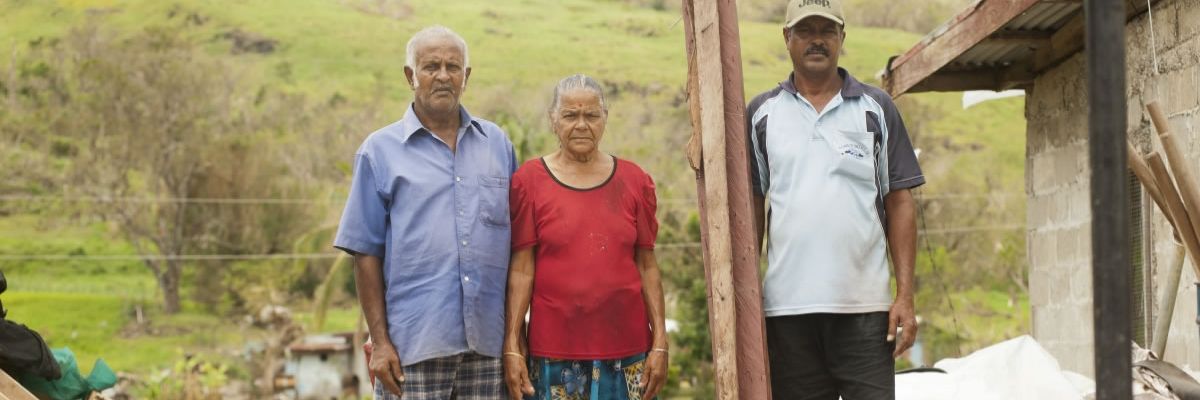
A family stands next to their destroyed home after a super-storm
Today, however, we have to realize that a true ecological approach always becomes a social approach; it must integrate questions of justice in debates on the environment, so as to hear both the cry of the earth and the cry of the poor. -Pope Francis (Laudato Si’, #49)
The Catholic liturgical calendar and the Gregorian calendar have guided my life. The first takes me on my journey with Jesus and the second marks the days, weeks, and months of my life. Now, a third calendar reminds me to pray for Columbans and the vulnerable communities with whom they live and work in the South Pacific: the annual severe storm season.
In the Washington, DC area, I cannot grasp living in fear of severe weather each year and then suffering the aftermath for months or even years before another severe storm strikes. In our area, federal, state and local governments work together to promptly restore utilities, remove devastation, and rebuild as soon as possible. Private insurance covers many losses. Then, people return to their homes, go back to work, and schools reopen.
There is no immediate return to normal for vulnerable communities in the South Pacific, where climate change has intensified the severity of cyclical hurricanes, tornadoes, and typhoons. Increasing sea levels and extreme weather events continue to threaten the people of many nations where Columbans serve, including the Philippines and Fiji. In those countries, your livelihood may depend on whether you live on or near the coast or in a megacity.
In the South Pacific, the long-term burden of catastrophic storms falls disproportionately on vulnerable communities, often indigenous communities or those living in poverty. A perfect storm can wipe out fishing, agriculture, and logging, which are the only livelihoods for many. Without a home or a livelihood, vulnerable people are forced to migrate, either internally or externally. Many end up living in city slums or displaced persons’ camps where the standard of living pushes them deeper into poverty and into health risks. Sadly, international law does not give these environmental refugees legal protection.
In January 2015, Pope Francis visited the Philippines to console the Tacloban people, who were still suffering enormously from Typhoon Haiyan in 2013 and Typhoon Hagupit in December 2014. Both wreaked unbelievable losses, which relentlessly continued when the oncoming Severe Storm Mekkhala forced Pope Francis to shorten his stay.
After his visit to the Philippines, Pope Francis pleaded with the world to recognize the “tragic rise in the number of migrants seeking to flee from the growing poverty caused by environmental degradation” (LS 25). Moreover, Pope Francis advocated to world leaders to recognize environmental refugees under international conventions. Yet, the cry of the earth and the cry of the poor still go unanswered (LS 49).
Neither Laudato Si’ nor the Paris Agreement prevented Tropical Cylcone Winston, a category 5 cyclone, from devastating Fiji in 2016. When I read Fr. John McEvoy’s SSC vivid Fiji report, I could not comprehend the severity of the storm that gave “no mercy” and left Fiji “numb, shell-shocked and overwhelmed.” Fr. John wrote that Winston “emotionally affected us all and like the nation we are somewhat paralysed, crying within and unable to get up and move into action.”
In the Philippines, Virgenia O. Vidad is the Coordinator of "Pedaling to Live and Green Shelter Program, Inc." Fr. Oliver McCrossan, SSC started that program to help those in poverty purchase their own tricycles to collect fares from customers. Then, on December 22, 2017, Typhoon Vinta caused a catastrophic loss of lives and left a trail of unprecedented devastation in the Philippines. In its destructive path were the "Pedaling to Live and Green Shelter Program," farmland, fishing areas, and livestock.
In her report of Typhoon Vinta and its aftermath, Ms. Vidad describes the immediate loss of lives, livelihood, and the flooding. She explains how families tried to care for their loved ones and how a young man saved his pregnant wife. Instead of brooding about the tragic ending of her program, farming, and cattle raising, Ms. Vidad reported how "Pedaling to Live and Green Shelter" staff and Fr. Oliver worked together with some volunteers to help those worst affected by Typhoon Vinta.
As I see Columbans compassionately living and working among communities vulnerable to climate change and environmental degradation, especially in the aftermath of severe storms in the South Pacific, I ask Jesus to breathe new energies into the lives of Columbans. Columbans do not forsake the vulnerable when disaster strikes, but stay to give hope to their sadness, console their losses, and help rebuild their lives. Only a special person devoted to Jesus and the poor can do that.
In this same spirit, Columbans continue to care for creation, urging the family of nations to address the human factors that cause climate change by reducing their dependency on fossil fuels. We are called to listen to the testimony of our sisters and brothers in the Philippines and Fiji by addressing climate change and reducing our contribution to extreme weather events and the rising sea levels which destroy their lives and devastate their island nations.
- Log in to post comments
 St. Columban Mission for Justice, Peace and Ecology
St. Columban Mission for Justice, Peace and Ecology